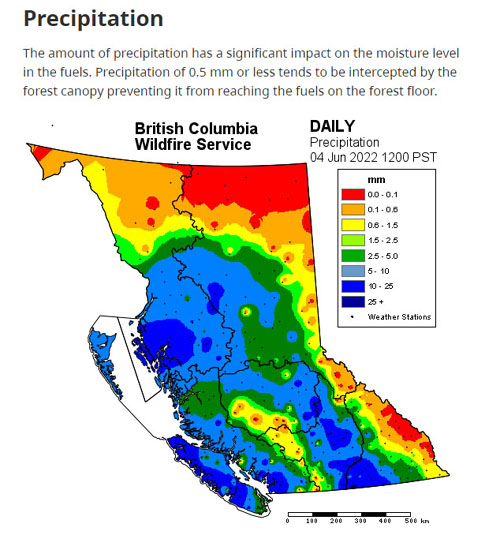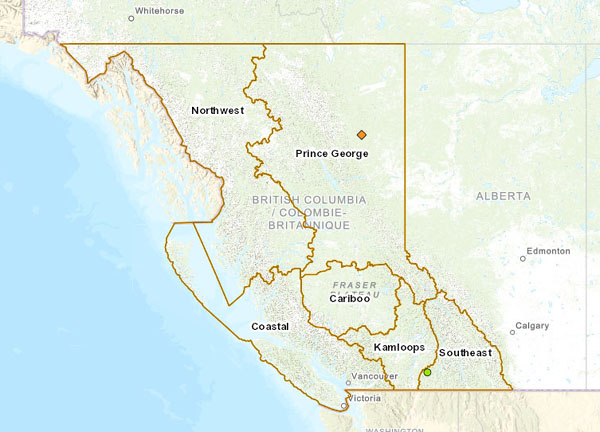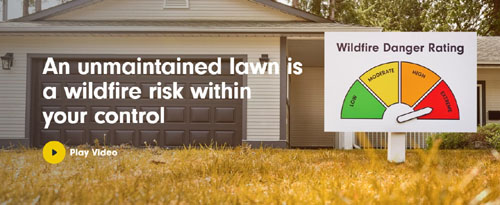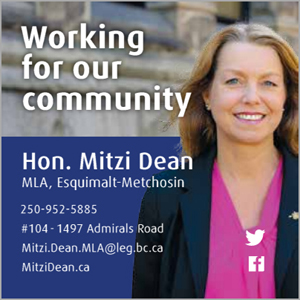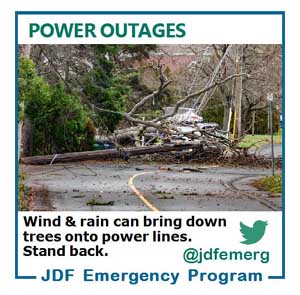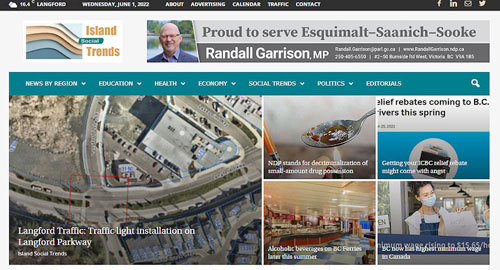Saturday June 4, 2022 | VICTORIA, BC
by Mary P Brooke | Island Social Trends
British Columbians can expect cooler and wetter conditions in June, says the BC Ministry of Forests. That’s on the heels of a cooler, wetter April and May which has impacted recreation and gardening plans for residents. But in the forests, the foliage that becomes ‘fuel’ for forest fires has continued to grow. When fire season does hit — expected later this summer — that could literally add fuel to the fire.
In their media session yesterday, they said the fire hazard is anticipated to remain low through the early summer, as shown in the BC Wildfire Service’s latest seasonal (June) outlook.
Some regional dry-spots:
Despite this, there are several key regions demonstrating drier-than-normal patterns, including southern Cariboo, Thompson-Okanagan and Rocky Mountain Trench. These regions will be monitored closely.
The longer-range forecast indicates a shift to above seasonal temperatures for late July and August, which may bring an increased wildfire hazard.
Historic investment in wildfire management:
To support wildfire prevention, preparedness and resilient communities, Budget 2022 provided $359 million in new funding to protect British Columbians from wildfires.
This is the largest investment in the history of the wildfire service and is helping transform the organization into a year-round service and shift from its current reactive model to a more proactive approach.
This includes $145 million to strengthen the BC Wildfire Service and Emergency Management BC. This will enable the BC Wildfire Service to focus on all four pillars of wildfire management: prevention and mitigation; preparedness; response; and recovery.
Planning ahead:
“Last year’s devastating fire season highlighted the importance of wildfire prevention for B.C. communities and, as we saw first-hand in Logan Lake, how it can make a real difference for people’s lives,” said Katrine Conroy, Minister of Forests.
“That’s why our government is more than doubling the funding available for wildfire prevention activities like FireSmart and making historic investments to transform BC Wildfire Service into a year-round, more proactive service.”
As much as $90 million in new Community Resiliency Investment program funding will also be provided to local governments and First Nations to increase wildfire protection by undertaking community-based FireSmart activities over the next three years.
Since the Community Resiliency Investment program was established in 2018, 488 grants to local governments and First Nations have been approved totalling more than $50 million.
First Nations communities:
“First Nations’ Emergency Services Society of B.C. is looking forward to the opportunity to continue serving First Nation communities in B.C., working with our program partners to deliver FireSmart community funding and supports,” said Quentin Nelson, mitigation manager, First Nations’ Emergency Services Society.
“These programs increase community resiliency, reduce risk from wildfire, and build capacity to support these initiatives.”
The Province has provided ongoing funding to the First Nations’ Emergency Services Society of B.C. to support the inclusion of Traditional Knowledge, which led directly to the initiation of a Cultural and Prescribed Fire initiative. Working in partnership with First Nations to expand the use of cultural and prescribed burning is critical to mitigating the risk of wildfires. Integrating traditional practices and cultural uses of fire into wildfire prevention and supporting the reintroduction of strategized burning is also a commitment of the Declaration on the Rights of Indigenous Peoples Act Action Plan.
FireSmart:
The Union of B.C. Municipalities (UBCM) administers the FireSmart Community Funding and Supports program. It processes grant applications in partnership with the Ministry of Forests and the First Nations’ Emergency Services Society of B.C. Eligible applicants facing a lower wildfire risk can apply for as much as $50,000, while applicants facing a demonstrated higher wildfire risk can apply for up to $150,000. Communities can apply for funding to cover up to 100% of the cost of their wildfire risk reduction projects.
“UBCM members have called on the Provincial government for many years to support wildfire risk reduction activities in and around their communities,” said Laurey-Anne Roodenburg, president, UBCM.
“The additional $90 million will allow communities to continue their efforts to reduce wildfire risk and increase local resiliency, and we are very happy to see the Province further its commitment to supporting local and Indigenous governments.”
Funding of $98 million over three years is also provided to fund wildfire prevention work and projects and maintain forest service roads, and more than $26 million in capital funding has been provided to increase capacity, address maintenance needs, and equip firebases for future wildfire seasons.
Smoky skies:
Even though wildfires may not occur in some areas of BC, communities have experienced smoky skies in many areas of the province during the active wildfire season.

Smoky air and heat can pose health risks.
===== LINKS:
June Wildfire Seasonal Outlook (BC Wildfire)
Daily Wildfire Statistics (lightning-caused & human-caused) | Wildfires of Note | BC Wildfire Dashboard
BC Wildfire Service mobile app:
- Apple (IOS): Download directly from the App Store (IOS): https://apps.apple.com/us/app/bc-wildfire-service/id1477675008?ls=1
- Android: Download directly from the Google Play Store: https://play.google.com/store/apps/details?id=ca.bc.gov.WildfireInformation&hl=en (https://play.google.com/store/apps/details?id=ca.bc.gov.WildfireInformation&hl=en)
FireSmart program and the seven FireSmart disciplines
Community Resiliency Investment program
Community Resiliency Investment grants are available on the Union of B.C. Municipalities website
===== RELATED:
Smoky air is a health hazard, but heat trumps that (July 24, 2021)
Smoky skies all over southern BC (September 11, 2020)
Air quality alerts now by text messaging as well as email (May 31, 2020)
Get BC air quality advisories direct to your email (October 5, 2019)




